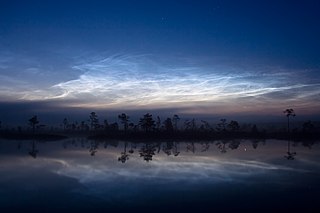
Viljandi County is one of 15 counties of Estonia. It is located in southern Estonia bordering Pärnu, Järva, Jõgeva, Tartu and Valga counties.

Lahemaa National Park is a park in northern Estonia, 70 kilometers east from the capital Tallinn. The Gulf of Finland is to the north of the park and the Tallinn-Narva highway (E20) is to the south. Its area covers 747 km2. It was the first area to be designated a national park of the former Soviet Union. It is the largest park in Estonia and one of Europe's biggest national parks. Its charter calls for the preservation, research and promotion of North-Estonian landscapes, ecosystems, biodiversity and national heritage.
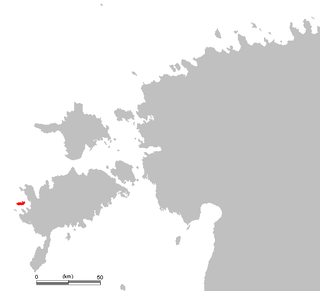
The island of Vilsandi, Saaremaa Parish, Saare County, Estonia is located in the Baltic Sea. It covers an area of some 9 square km and is the westernmost populated island in Estonia. The surrounding waters are shallow and rocky and many ships travelling the Baltic have perished nearby. The island of Vilsandi can be reached by boat, by truck having suitable clearance or on foot by wading from Saaremaa. Much of the island is now part of Vilsandi National Park, which grew from a bird reserve founded in 1910. It is a highly sensitive ecosystem due to the use of the area by many migratory birds as a breeding and nesting ground. Hunting is absolutely prohibited. This park is a popular tourist destination not only for local Estonians, but also people of Finland who are visiting Estonia in greater and greater numbers.

Aa is a village in northern Estonia, on the southern coast of the Gulf of Finland in the eastern part of the Lüganuse Parish of Ida-Viru County, 10 km (6.2 mi) from Lüganuse. Part of the village, including the Aa manor house, is situated on the North Estonian limestone bank.

Kesklinn is one of the 8 administrative districts of Tallinn, the capital of Estonia. It is situated on the Tallinn Bay and bordered to the northwest by the district of Põhja-Tallinn, to the west by Kristiine, to the southwest by Nõmme, to the east by Lasnamäe and Pirita, and to the south by Rae Parish, beyond Lake Ülemiste. The island of Aegna, located in the Tallinn Bay, also falls within this administrative district. Kesklinn has an area of 30.6 km2 (11.8 sq mi) and a population of 57,731 ; population density is 1,886.6/km2 (4,886/sq mi).
Protected areas of Estonia are regulated by the Nature Conservation Act, which was passed by the Estonian parliament on April 21, 2004 and entered into force May 10, 2004. Overall Estonia has 15403 Protected Areas covering 21.21% of the country land and 18.78% of it marine and coastal territory.
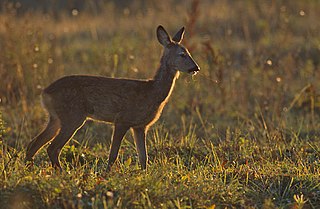
Estonia is a small, heavily forested country situated on the Baltic Sea. It is a part of the Euro-Siberian region of terrestrial Palearctic realm, and the Temperate Northern Atlantic marine ecoregion.

Ahja is a small borough in Põlva Parish, Põlva County in southeastern Estonia. Named after the Ahja River, it is located 191 km southeast of Tallinn and about 16km north of Põlva.

Kose-Uuemõisa is a small borough in Kose Parish, Harju County in northern Estonia.
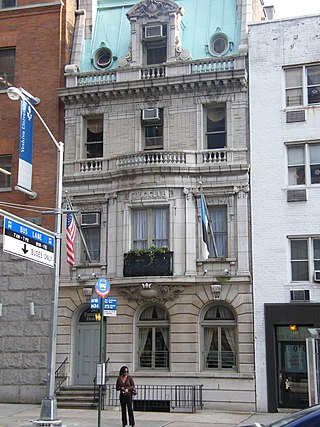
The Civic Club building, now the New York Estonian House, is a four-story Beaux-Arts building located at 243 East 34th Street between Second and Third Avenues in the Murray Hill neighborhood of Manhattan in New York City.

Alu is a small borough in Rapla Parish, Rapla County, Estonia. It's located about 3 km (2 mi) northwest of the town of Rapla. Alu has a population of c. 950.
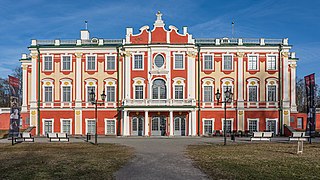
Kadriorg Palace is an 18th-century Petrine Baroque palace in Kadriorg, Tallinn, the capital of Estonia. Both the Estonian and the German name for the palace means "Catherine's valley". It was built in 1718–1725 to Nicola Michetti's designs by Gaetano Chiaveri and Mikhail Zemtsov. The palace currently houses the Kadriorg Art Museum, a branch of the Art Museum of Estonia, displaying foreign art from the 16th to 20th centuries. The building of the Kumu branch of the museum, showing Estonian art from the 18th century onwards is located nearby in the Kadriorg Park.

Penijõe is a village in Lääneranna Parish, Pärnu County, in western Estonia; in the centre of Matsalu National Park.

Palmse is a village in Haljala Parish, Lääne-Viru County, in northern Estonia, on the territory of Lahemaa National Park.

Sagadi is a village in Haljala Parish, Lääne-Viru County, in northern Estonia, located within the territory of Lahemaa National Park.

Loona is a village in Saaremaa Parish, Saare County in western Estonia.

Tauksi is an uninhabited Estonian island, located north of Puise Peninsula in Matsalu National Park. Its area is about 2,5 km2 and it is the 19th largest island of Estonia.

Puurmani manor is a historical manor located in the village of Puurmani, Jõgeva County, Estonia. The manor is protected by the Estonian government as a cultural heritage object. The object was listed on November 23, 1999, and has the number 23988.


















